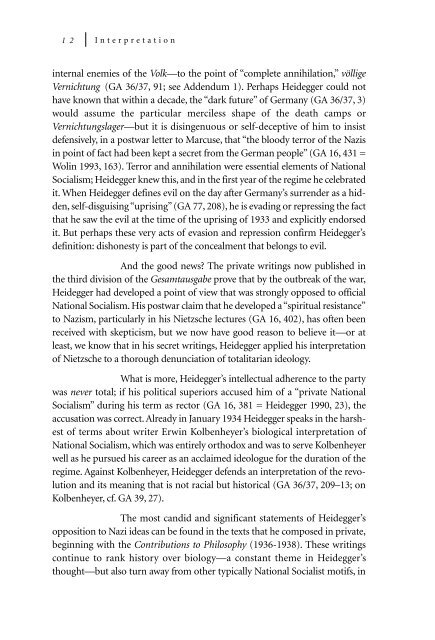Beyond Struggle and Power: Heidegger's Secret ... - Interpretation
Beyond Struggle and Power: Heidegger's Secret ... - Interpretation
Beyond Struggle and Power: Heidegger's Secret ... - Interpretation
You also want an ePaper? Increase the reach of your titles
YUMPU automatically turns print PDFs into web optimized ePapers that Google loves.
1 2 <strong>Interpretation</strong><br />
internal enemies of the Volk—to the point of “complete annihilation,” völlige<br />
Vernichtung (GA 36/37, 91; see Addendum 1). Perhaps Heidegger could not<br />
have known that within a decade, the “dark future” of Germany (GA 36/37, 3)<br />
would assume the particular merciless shape of the death camps or<br />
Vernichtungslager—but it is disingenuous or self-deceptive of him to insist<br />
defensively, in a postwar letter to Marcuse, that “the bloody terror of the Nazis<br />
in point of fact had been kept a secret from the German people” (GA 16, 431 =<br />
Wolin 1993, 163). Terror <strong>and</strong> annihilation were essential elements of National<br />
Socialism; Heidegger knew this, <strong>and</strong> in the first year of the regime he celebrated<br />
it. When Heidegger defines evil on the day after Germany’s surrender as a hidden,<br />
self-disguising “uprising” (GA 77, 208), he is evading or repressing the fact<br />
that he saw the evil at the time of the uprising of 1933 <strong>and</strong> explicitly endorsed<br />
it. But perhaps these very acts of evasion <strong>and</strong> repression confirm Heidegger’s<br />
definition: dishonesty is part of the concealment that belongs to evil.<br />
And the good news? The private writings now published in<br />
the third division of the Gesamtausgabe prove that by the outbreak of the war,<br />
Heidegger had developed a point of view that was strongly opposed to official<br />
National Socialism. His postwar claim that he developed a “spiritual resistance”<br />
to Nazism, particularly in his Nietzsche lectures (GA 16, 402), has often been<br />
received with skepticism, but we now have good reason to believe it—or at<br />
least, we know that in his secret writings, Heidegger applied his interpretation<br />
of Nietzsche to a thorough denunciation of totalitarian ideology.<br />
What is more, Heidegger’s intellectual adherence to the party<br />
was never total; if his political superiors accused him of a “private National<br />
Socialism” during his term as rector (GA 16, 381 = Heidegger 1990, 23), the<br />
accusation was correct. Already in January 1934 Heidegger speaks in the harshest<br />
of terms about writer Erwin Kolbenheyer’s biological interpretation of<br />
National Socialism, which was entirely orthodox <strong>and</strong> was to serve Kolbenheyer<br />
well as he pursued his career as an acclaimed ideologue for the duration of the<br />
regime. Against Kolbenheyer, Heidegger defends an interpretation of the revolution<br />
<strong>and</strong> its meaning that is not racial but historical (GA 36/37, 209–13; on<br />
Kolbenheyer, cf. GA 39, 27).<br />
The most c<strong>and</strong>id <strong>and</strong> significant statements of Heidegger’s<br />
opposition to Nazi ideas can be found in the texts that he composed in private,<br />
beginning with the Contributions to Philosophy (1936-1938). These writings<br />
continue to rank history over biology—a constant theme in Heidegger’s<br />
thought—but also turn away from other typically National Socialist motifs, in
















